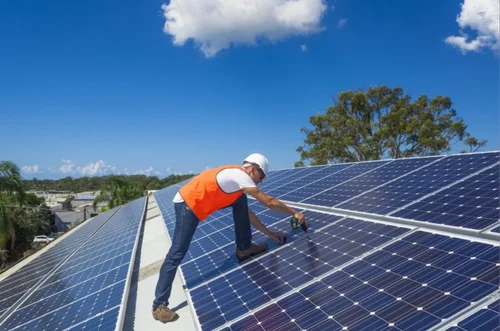Islamabad, Apr 14, 2025: Pakistan has become the world’s largest importer of solar panels, even without a clear national renewable energy policy, substantial foreign investments, or strong political backing.
A global report by the British energy think tank Amber reveals that in 2024, Pakistan imported 17 gigawatts (GW) of solar panels, more than twice the amount imported in 2023.
This rapid increase makes Pakistan one of the fastest-growing markets for solar energy globally.
Individuals, households, and small businesses in Pakistan have largely driven the solar boom by seeking affordable and dependable alternatives to the costly and inconsistent electricity provided by the national grid, unlike numerous countries where government-led initiatives drive solar energy growth.
The report describes this as a “grassroots energy revolution,” noting that the growth happened without significant governmental programs, international funding, or major upgrades to public infrastructure.
The fiscal year 2024 is expected to see solar installations meet nearly half of Pakistan’s total electricity demand.
Read More: Trump Tariffs Pose $1.4 Bln Threat to Pakistan Exports
However, most of these installations remain off-grid, meaning they do not appear in the official national energy statistics.
Experts highlight that this rapid transition signifies an increasing disconnect between energy users and the national grid, which continues to face issues such as power outages, poor planning, and rising prices.
For many, adopting solar energy is not just an environmentally conscious decision but a practical solution to ongoing electricity challenges.
Regulators have implemented some changes, like net metering and relaxed import restrictions, but concerns about the grid’s capacity to integrate and support this decentralized energy production remain.
There are mounting calls for urgent reforms in energy planning to better accommodate the growing solar sector.
Adding to the uncertainty, the federal government recently decided to lower the rates for net metering buyback—the compensation offered to solar users who send surplus electricity back to the grid.
This policy change has been met with criticism from industry stakeholders, who argue that it damages confidence in the renewable energy market.
Following this move, solar panel prices—especially in Sindh—have dropped significantly, with some prices falling by up to 25%.
For instance, a Grade-A 585-watt panel that once cost Rs22,000 is now available for around Rs16,500.
Current Solar Panel Prices (April 2025):
| Brand | Wattage | Price (Rs) |
|---|---|---|
| Imported | 545W | 16,500 |
| JA Solar (Single Glass) | 540W | 19,000 |
| Canadian (Tier 1) | 555W | 19,500 |
| Longi (Single Glass) | 550W | 20,000 |
| Canadian Topcon | 575W | 20,500 |
Other B-grade panels and various models have also experienced similar price reductions.
While this price decrease may benefit consumers in the short term, industry experts caution that continued policy changes, such as reduced net metering rates, could obstruct long-term growth in Pakistan’s solar market and deter future investment.
As Pakistan’s energy future becomes increasingly shaped by consumer-driven innovation rather than institutional planning, experts emphasize the need for a unified strategy to guarantee the sector’s long-term stability and sustainability.
